University Law of Torts Assignment: BUS107 Commercial Law
VerifiedAdded on 2022/09/10
|7
|1648
|23
Homework Assignment
AI Summary
This assignment solution analyzes a Law of Torts case involving Tamara and Aldi Supermarket. It addresses whether Aldi owed Tamara a duty of care, if that duty was breached, and if Aldi's actions caused Tamara's injuries. The solution uses the IRAC method, citing relevant case law like Caparo Industries v Dickman, Donoghue v Stevenson, and Bolton v Stone to support its arguments. It also examines potential defenses for Aldi, including contributory negligence and voluntary assumption of risk. The assignment concludes that Aldi breached its duty of care by not putting up a sign warning of spillages, and is liable for damages suffered by Tamara. The analysis considers the foreseeability of harm, the standard of care, and the application of legal principles to the specific facts of the case.
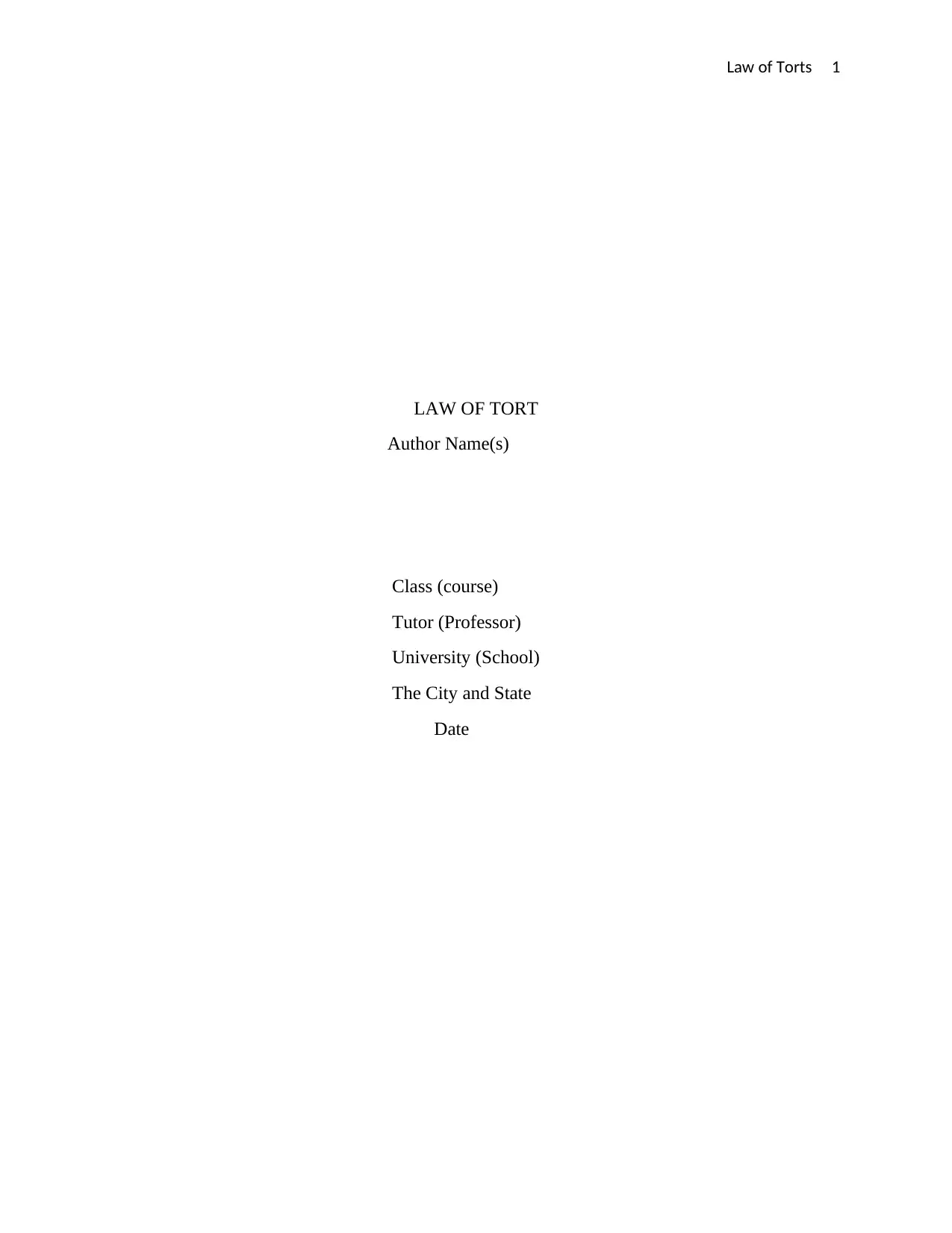
Law of Torts 1
LAW OF TORT
Author Name(s)
Class (course)
Tutor (Professor)
University (School)
The City and State
Date
LAW OF TORT
Author Name(s)
Class (course)
Tutor (Professor)
University (School)
The City and State
Date
Paraphrase This Document
Need a fresh take? Get an instant paraphrase of this document with our AI Paraphraser
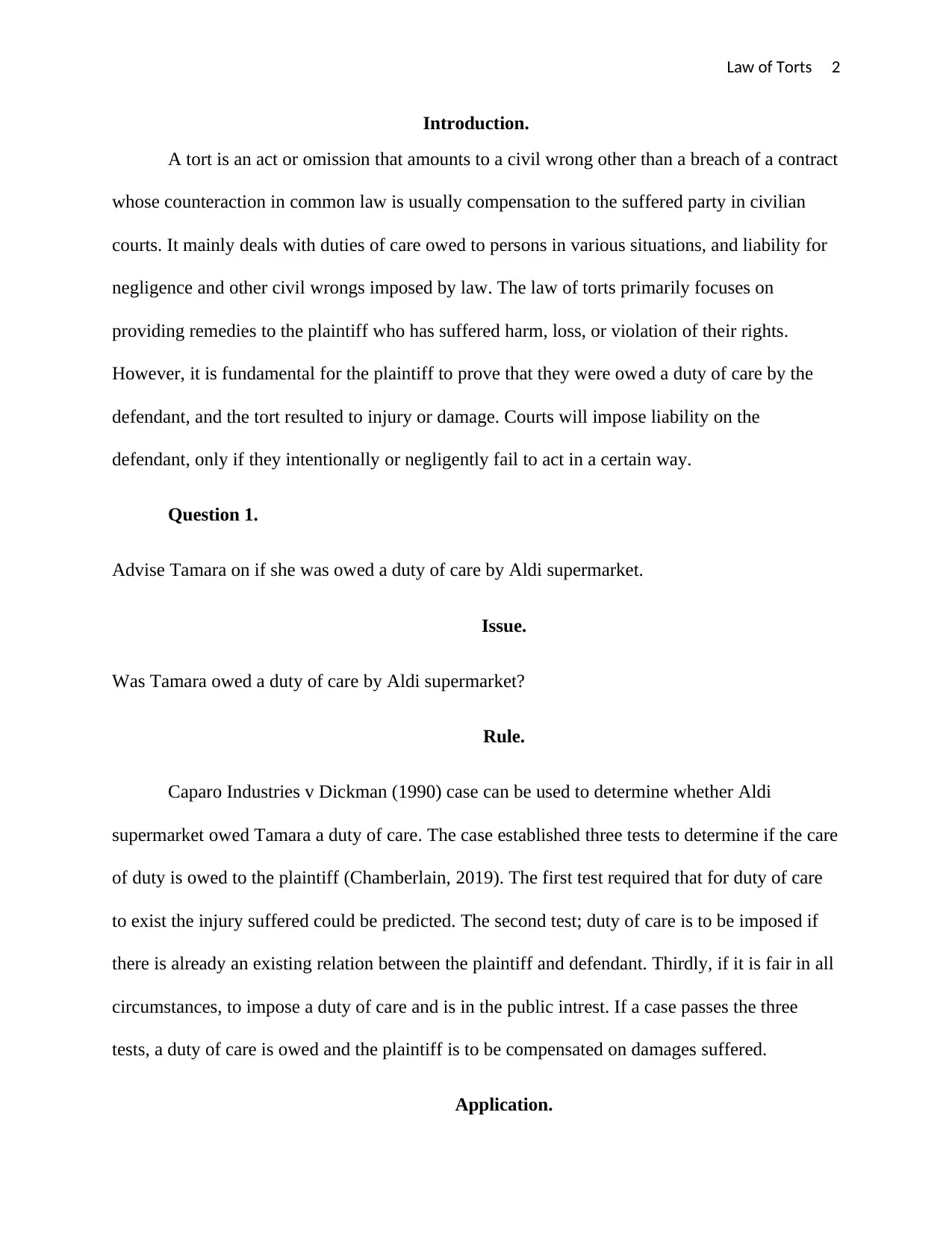
Law of Torts 2
Introduction.
A tort is an act or omission that amounts to a civil wrong other than a breach of a contract
whose counteraction in common law is usually compensation to the suffered party in civilian
courts. It mainly deals with duties of care owed to persons in various situations, and liability for
negligence and other civil wrongs imposed by law. The law of torts primarily focuses on
providing remedies to the plaintiff who has suffered harm, loss, or violation of their rights.
However, it is fundamental for the plaintiff to prove that they were owed a duty of care by the
defendant, and the tort resulted to injury or damage. Courts will impose liability on the
defendant, only if they intentionally or negligently fail to act in a certain way.
Question 1.
Advise Tamara on if she was owed a duty of care by Aldi supermarket.
Issue.
Was Tamara owed a duty of care by Aldi supermarket?
Rule.
Caparo Industries v Dickman (1990) case can be used to determine whether Aldi
supermarket owed Tamara a duty of care. The case established three tests to determine if the care
of duty is owed to the plaintiff (Chamberlain, 2019). The first test required that for duty of care
to exist the injury suffered could be predicted. The second test; duty of care is to be imposed if
there is already an existing relation between the plaintiff and defendant. Thirdly, if it is fair in all
circumstances, to impose a duty of care and is in the public intrest. If a case passes the three
tests, a duty of care is owed and the plaintiff is to be compensated on damages suffered.
Application.
Introduction.
A tort is an act or omission that amounts to a civil wrong other than a breach of a contract
whose counteraction in common law is usually compensation to the suffered party in civilian
courts. It mainly deals with duties of care owed to persons in various situations, and liability for
negligence and other civil wrongs imposed by law. The law of torts primarily focuses on
providing remedies to the plaintiff who has suffered harm, loss, or violation of their rights.
However, it is fundamental for the plaintiff to prove that they were owed a duty of care by the
defendant, and the tort resulted to injury or damage. Courts will impose liability on the
defendant, only if they intentionally or negligently fail to act in a certain way.
Question 1.
Advise Tamara on if she was owed a duty of care by Aldi supermarket.
Issue.
Was Tamara owed a duty of care by Aldi supermarket?
Rule.
Caparo Industries v Dickman (1990) case can be used to determine whether Aldi
supermarket owed Tamara a duty of care. The case established three tests to determine if the care
of duty is owed to the plaintiff (Chamberlain, 2019). The first test required that for duty of care
to exist the injury suffered could be predicted. The second test; duty of care is to be imposed if
there is already an existing relation between the plaintiff and defendant. Thirdly, if it is fair in all
circumstances, to impose a duty of care and is in the public intrest. If a case passes the three
tests, a duty of care is owed and the plaintiff is to be compensated on damages suffered.
Application.
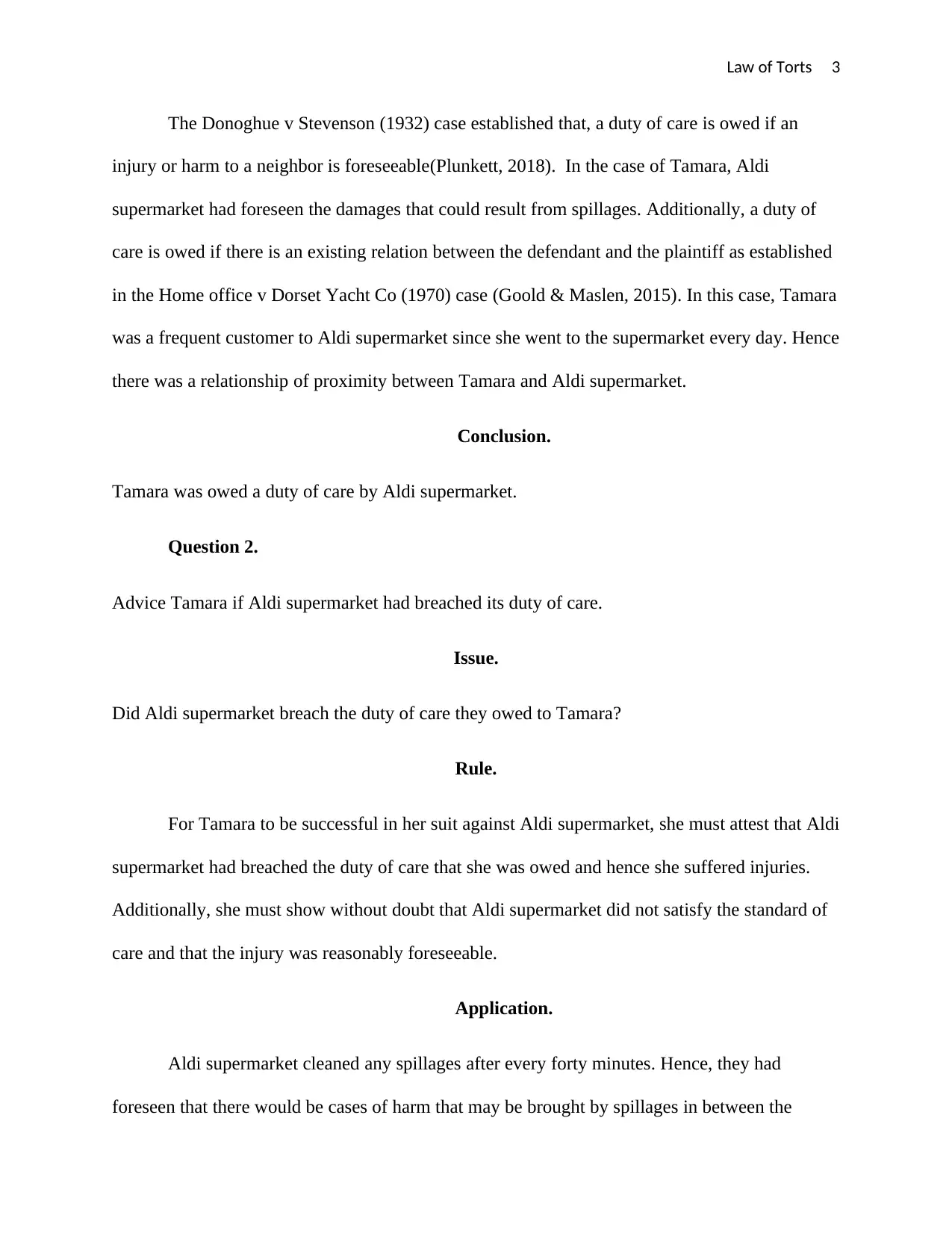
Law of Torts 3
The Donoghue v Stevenson (1932) case established that, a duty of care is owed if an
injury or harm to a neighbor is foreseeable(Plunkett, 2018). In the case of Tamara, Aldi
supermarket had foreseen the damages that could result from spillages. Additionally, a duty of
care is owed if there is an existing relation between the defendant and the plaintiff as established
in the Home office v Dorset Yacht Co (1970) case (Goold & Maslen, 2015). In this case, Tamara
was a frequent customer to Aldi supermarket since she went to the supermarket every day. Hence
there was a relationship of proximity between Tamara and Aldi supermarket.
Conclusion.
Tamara was owed a duty of care by Aldi supermarket.
Question 2.
Advice Tamara if Aldi supermarket had breached its duty of care.
Issue.
Did Aldi supermarket breach the duty of care they owed to Tamara?
Rule.
For Tamara to be successful in her suit against Aldi supermarket, she must attest that Aldi
supermarket had breached the duty of care that she was owed and hence she suffered injuries.
Additionally, she must show without doubt that Aldi supermarket did not satisfy the standard of
care and that the injury was reasonably foreseeable.
Application.
Aldi supermarket cleaned any spillages after every forty minutes. Hence, they had
foreseen that there would be cases of harm that may be brought by spillages in between the
The Donoghue v Stevenson (1932) case established that, a duty of care is owed if an
injury or harm to a neighbor is foreseeable(Plunkett, 2018). In the case of Tamara, Aldi
supermarket had foreseen the damages that could result from spillages. Additionally, a duty of
care is owed if there is an existing relation between the defendant and the plaintiff as established
in the Home office v Dorset Yacht Co (1970) case (Goold & Maslen, 2015). In this case, Tamara
was a frequent customer to Aldi supermarket since she went to the supermarket every day. Hence
there was a relationship of proximity between Tamara and Aldi supermarket.
Conclusion.
Tamara was owed a duty of care by Aldi supermarket.
Question 2.
Advice Tamara if Aldi supermarket had breached its duty of care.
Issue.
Did Aldi supermarket breach the duty of care they owed to Tamara?
Rule.
For Tamara to be successful in her suit against Aldi supermarket, she must attest that Aldi
supermarket had breached the duty of care that she was owed and hence she suffered injuries.
Additionally, she must show without doubt that Aldi supermarket did not satisfy the standard of
care and that the injury was reasonably foreseeable.
Application.
Aldi supermarket cleaned any spillages after every forty minutes. Hence, they had
foreseen that there would be cases of harm that may be brought by spillages in between the
⊘ This is a preview!⊘
Do you want full access?
Subscribe today to unlock all pages.

Trusted by 1+ million students worldwide
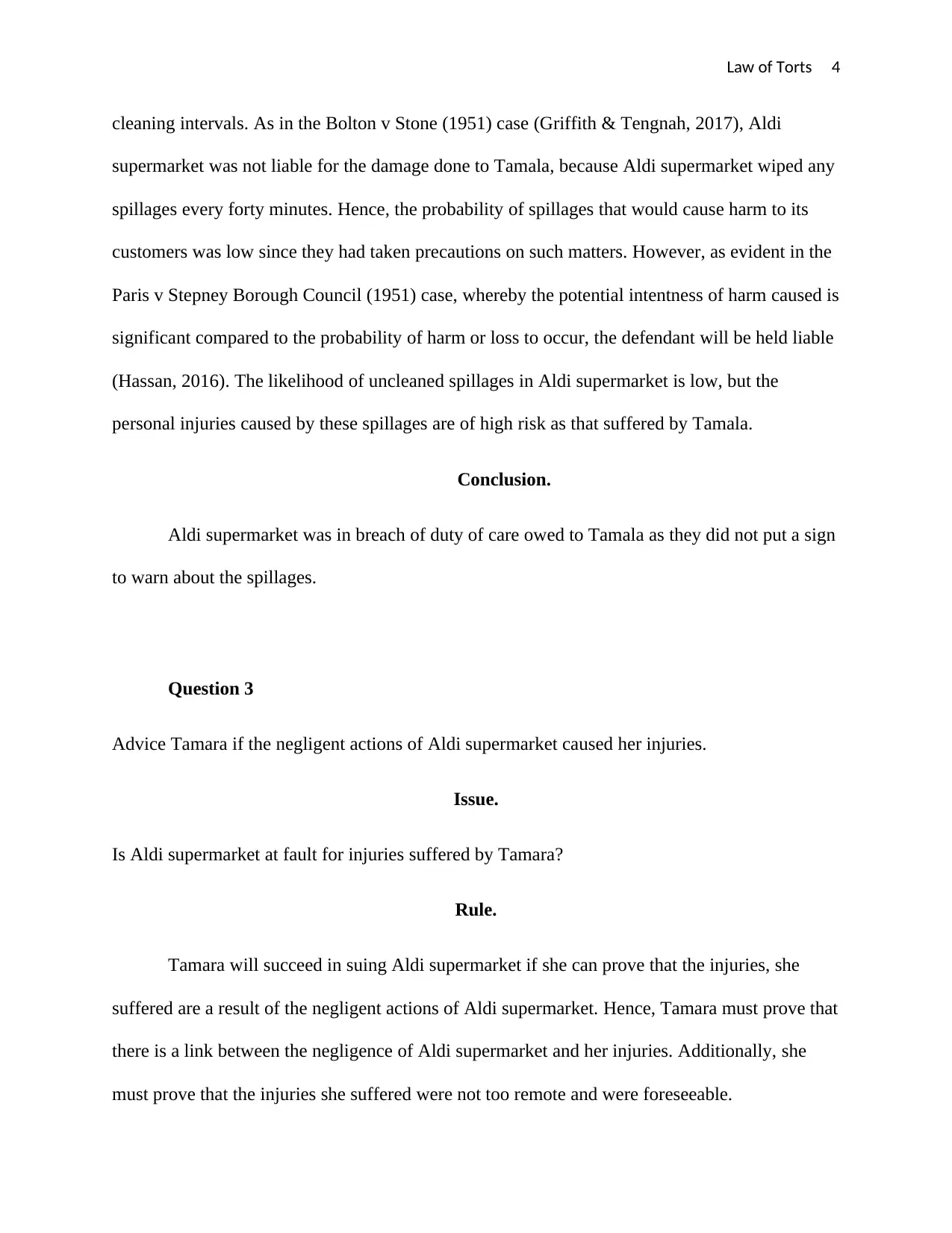
Law of Torts 4
cleaning intervals. As in the Bolton v Stone (1951) case (Griffith & Tengnah, 2017), Aldi
supermarket was not liable for the damage done to Tamala, because Aldi supermarket wiped any
spillages every forty minutes. Hence, the probability of spillages that would cause harm to its
customers was low since they had taken precautions on such matters. However, as evident in the
Paris v Stepney Borough Council (1951) case, whereby the potential intentness of harm caused is
significant compared to the probability of harm or loss to occur, the defendant will be held liable
(Hassan, 2016). The likelihood of uncleaned spillages in Aldi supermarket is low, but the
personal injuries caused by these spillages are of high risk as that suffered by Tamala.
Conclusion.
Aldi supermarket was in breach of duty of care owed to Tamala as they did not put a sign
to warn about the spillages.
Question 3
Advice Tamara if the negligent actions of Aldi supermarket caused her injuries.
Issue.
Is Aldi supermarket at fault for injuries suffered by Tamara?
Rule.
Tamara will succeed in suing Aldi supermarket if she can prove that the injuries, she
suffered are a result of the negligent actions of Aldi supermarket. Hence, Tamara must prove that
there is a link between the negligence of Aldi supermarket and her injuries. Additionally, she
must prove that the injuries she suffered were not too remote and were foreseeable.
cleaning intervals. As in the Bolton v Stone (1951) case (Griffith & Tengnah, 2017), Aldi
supermarket was not liable for the damage done to Tamala, because Aldi supermarket wiped any
spillages every forty minutes. Hence, the probability of spillages that would cause harm to its
customers was low since they had taken precautions on such matters. However, as evident in the
Paris v Stepney Borough Council (1951) case, whereby the potential intentness of harm caused is
significant compared to the probability of harm or loss to occur, the defendant will be held liable
(Hassan, 2016). The likelihood of uncleaned spillages in Aldi supermarket is low, but the
personal injuries caused by these spillages are of high risk as that suffered by Tamala.
Conclusion.
Aldi supermarket was in breach of duty of care owed to Tamala as they did not put a sign
to warn about the spillages.
Question 3
Advice Tamara if the negligent actions of Aldi supermarket caused her injuries.
Issue.
Is Aldi supermarket at fault for injuries suffered by Tamara?
Rule.
Tamara will succeed in suing Aldi supermarket if she can prove that the injuries, she
suffered are a result of the negligent actions of Aldi supermarket. Hence, Tamara must prove that
there is a link between the negligence of Aldi supermarket and her injuries. Additionally, she
must prove that the injuries she suffered were not too remote and were foreseeable.
Paraphrase This Document
Need a fresh take? Get an instant paraphrase of this document with our AI Paraphraser
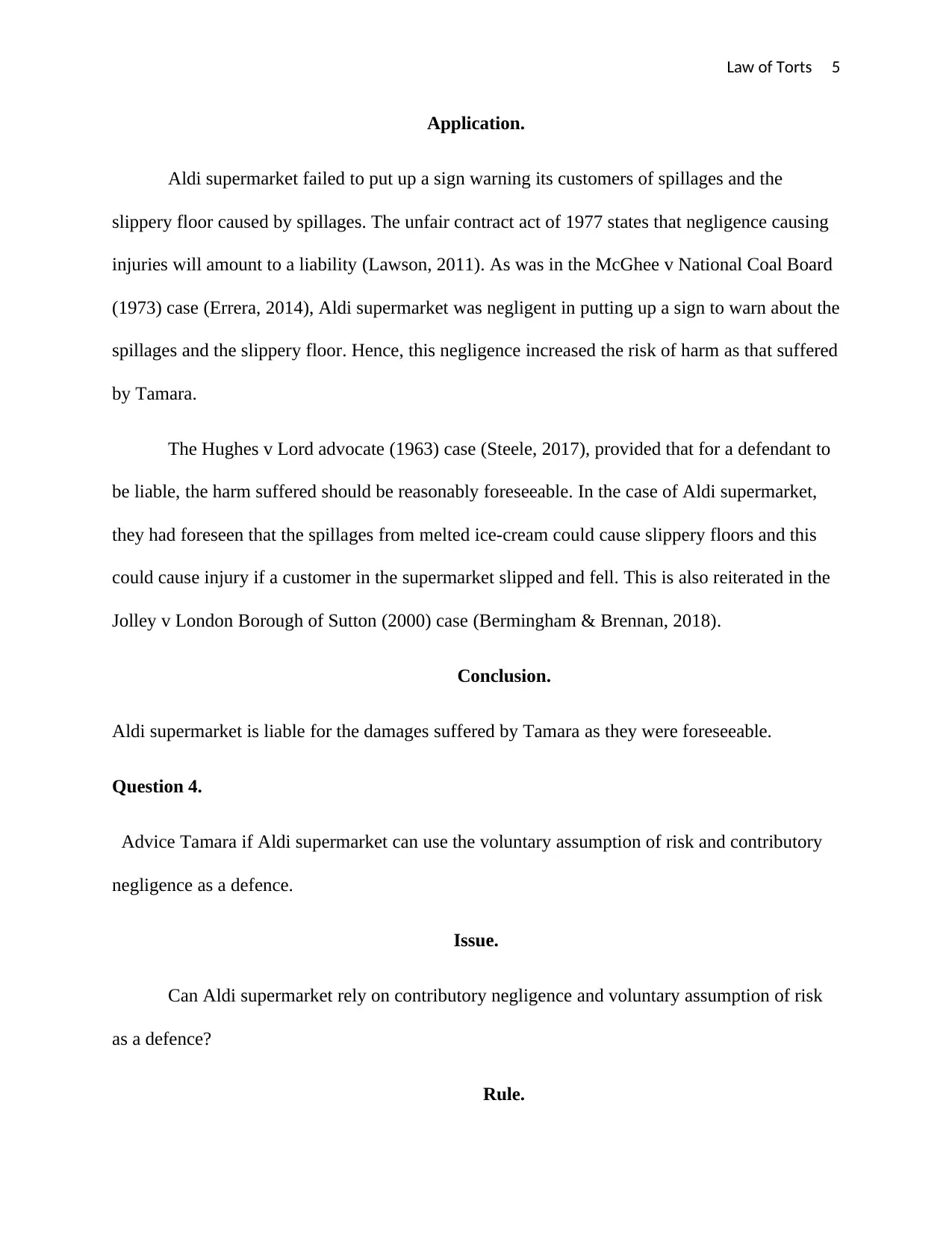
Law of Torts 5
Application.
Aldi supermarket failed to put up a sign warning its customers of spillages and the
slippery floor caused by spillages. The unfair contract act of 1977 states that negligence causing
injuries will amount to a liability (Lawson, 2011). As was in the McGhee v National Coal Board
(1973) case (Errera, 2014), Aldi supermarket was negligent in putting up a sign to warn about the
spillages and the slippery floor. Hence, this negligence increased the risk of harm as that suffered
by Tamara.
The Hughes v Lord advocate (1963) case (Steele, 2017), provided that for a defendant to
be liable, the harm suffered should be reasonably foreseeable. In the case of Aldi supermarket,
they had foreseen that the spillages from melted ice-cream could cause slippery floors and this
could cause injury if a customer in the supermarket slipped and fell. This is also reiterated in the
Jolley v London Borough of Sutton (2000) case (Bermingham & Brennan, 2018).
Conclusion.
Aldi supermarket is liable for the damages suffered by Tamara as they were foreseeable.
Question 4.
Advice Tamara if Aldi supermarket can use the voluntary assumption of risk and contributory
negligence as a defence.
Issue.
Can Aldi supermarket rely on contributory negligence and voluntary assumption of risk
as a defence?
Rule.
Application.
Aldi supermarket failed to put up a sign warning its customers of spillages and the
slippery floor caused by spillages. The unfair contract act of 1977 states that negligence causing
injuries will amount to a liability (Lawson, 2011). As was in the McGhee v National Coal Board
(1973) case (Errera, 2014), Aldi supermarket was negligent in putting up a sign to warn about the
spillages and the slippery floor. Hence, this negligence increased the risk of harm as that suffered
by Tamara.
The Hughes v Lord advocate (1963) case (Steele, 2017), provided that for a defendant to
be liable, the harm suffered should be reasonably foreseeable. In the case of Aldi supermarket,
they had foreseen that the spillages from melted ice-cream could cause slippery floors and this
could cause injury if a customer in the supermarket slipped and fell. This is also reiterated in the
Jolley v London Borough of Sutton (2000) case (Bermingham & Brennan, 2018).
Conclusion.
Aldi supermarket is liable for the damages suffered by Tamara as they were foreseeable.
Question 4.
Advice Tamara if Aldi supermarket can use the voluntary assumption of risk and contributory
negligence as a defence.
Issue.
Can Aldi supermarket rely on contributory negligence and voluntary assumption of risk
as a defence?
Rule.
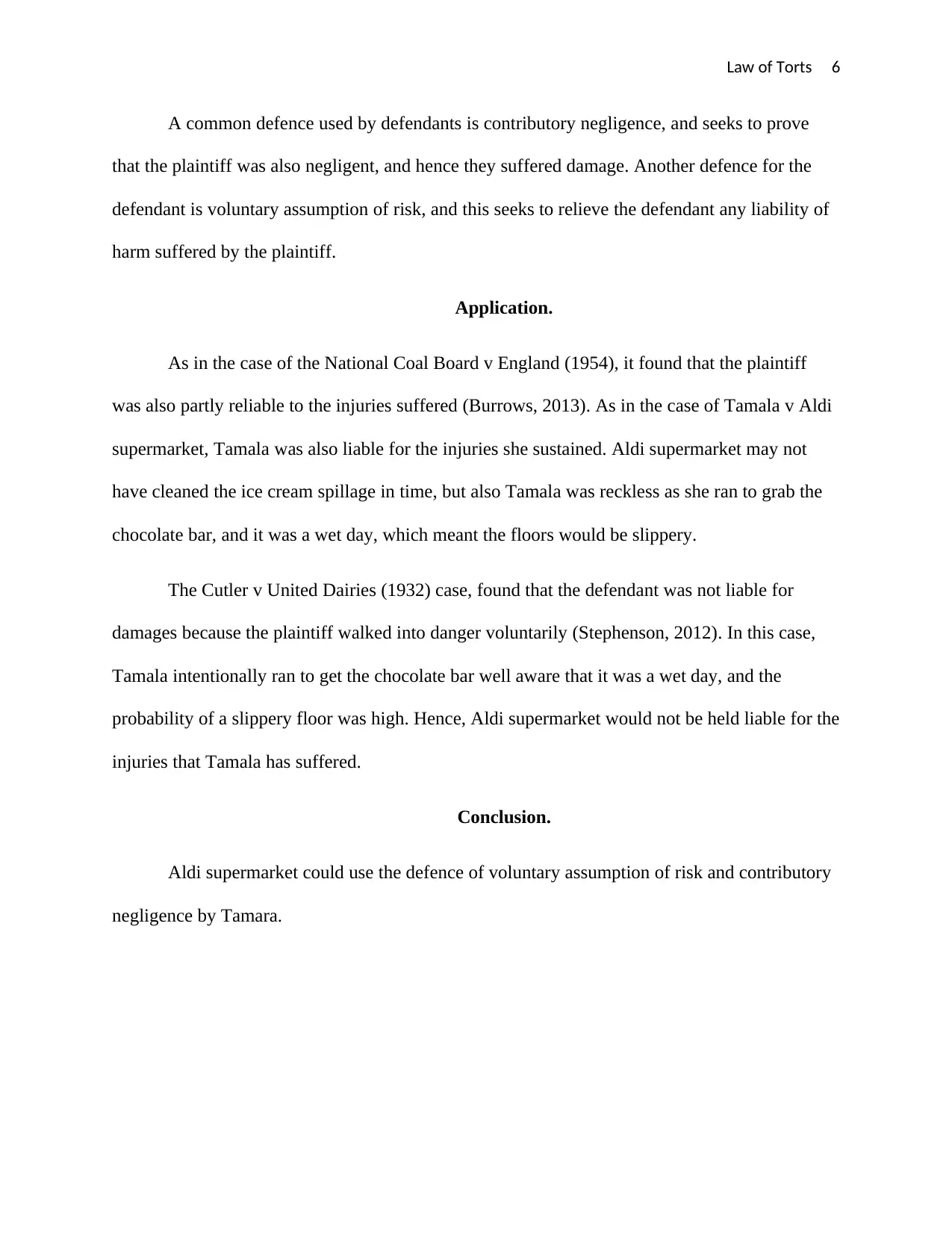
Law of Torts 6
A common defence used by defendants is contributory negligence, and seeks to prove
that the plaintiff was also negligent, and hence they suffered damage. Another defence for the
defendant is voluntary assumption of risk, and this seeks to relieve the defendant any liability of
harm suffered by the plaintiff.
Application.
As in the case of the National Coal Board v England (1954), it found that the plaintiff
was also partly reliable to the injuries suffered (Burrows, 2013). As in the case of Tamala v Aldi
supermarket, Tamala was also liable for the injuries she sustained. Aldi supermarket may not
have cleaned the ice cream spillage in time, but also Tamala was reckless as she ran to grab the
chocolate bar, and it was a wet day, which meant the floors would be slippery.
The Cutler v United Dairies (1932) case, found that the defendant was not liable for
damages because the plaintiff walked into danger voluntarily (Stephenson, 2012). In this case,
Tamala intentionally ran to get the chocolate bar well aware that it was a wet day, and the
probability of a slippery floor was high. Hence, Aldi supermarket would not be held liable for the
injuries that Tamala has suffered.
Conclusion.
Aldi supermarket could use the defence of voluntary assumption of risk and contributory
negligence by Tamara.
A common defence used by defendants is contributory negligence, and seeks to prove
that the plaintiff was also negligent, and hence they suffered damage. Another defence for the
defendant is voluntary assumption of risk, and this seeks to relieve the defendant any liability of
harm suffered by the plaintiff.
Application.
As in the case of the National Coal Board v England (1954), it found that the plaintiff
was also partly reliable to the injuries suffered (Burrows, 2013). As in the case of Tamala v Aldi
supermarket, Tamala was also liable for the injuries she sustained. Aldi supermarket may not
have cleaned the ice cream spillage in time, but also Tamala was reckless as she ran to grab the
chocolate bar, and it was a wet day, which meant the floors would be slippery.
The Cutler v United Dairies (1932) case, found that the defendant was not liable for
damages because the plaintiff walked into danger voluntarily (Stephenson, 2012). In this case,
Tamala intentionally ran to get the chocolate bar well aware that it was a wet day, and the
probability of a slippery floor was high. Hence, Aldi supermarket would not be held liable for the
injuries that Tamala has suffered.
Conclusion.
Aldi supermarket could use the defence of voluntary assumption of risk and contributory
negligence by Tamara.
⊘ This is a preview!⊘
Do you want full access?
Subscribe today to unlock all pages.

Trusted by 1+ million students worldwide
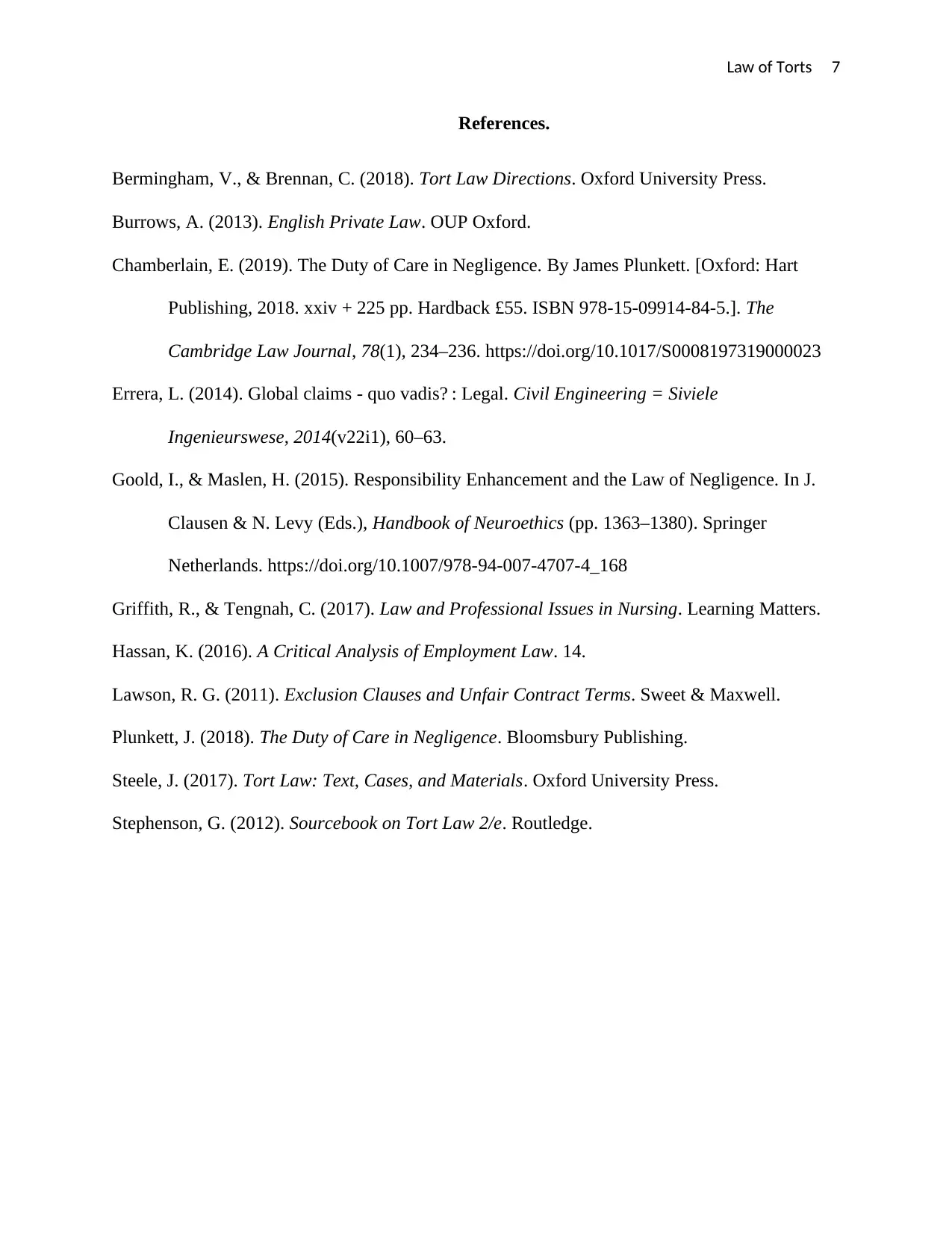
Law of Torts 7
References.
Bermingham, V., & Brennan, C. (2018). Tort Law Directions. Oxford University Press.
Burrows, A. (2013). English Private Law. OUP Oxford.
Chamberlain, E. (2019). The Duty of Care in Negligence. By James Plunkett. [Oxford: Hart
Publishing, 2018. xxiv + 225 pp. Hardback £55. ISBN 978-15-09914-84-5.]. The
Cambridge Law Journal, 78(1), 234–236. https://doi.org/10.1017/S0008197319000023
Errera, L. (2014). Global claims - quo vadis? : Legal. Civil Engineering = Siviele
Ingenieurswese, 2014(v22i1), 60–63.
Goold, I., & Maslen, H. (2015). Responsibility Enhancement and the Law of Negligence. In J.
Clausen & N. Levy (Eds.), Handbook of Neuroethics (pp. 1363–1380). Springer
Netherlands. https://doi.org/10.1007/978-94-007-4707-4_168
Griffith, R., & Tengnah, C. (2017). Law and Professional Issues in Nursing. Learning Matters.
Hassan, K. (2016). A Critical Analysis of Employment Law. 14.
Lawson, R. G. (2011). Exclusion Clauses and Unfair Contract Terms. Sweet & Maxwell.
Plunkett, J. (2018). The Duty of Care in Negligence. Bloomsbury Publishing.
Steele, J. (2017). Tort Law: Text, Cases, and Materials. Oxford University Press.
Stephenson, G. (2012). Sourcebook on Tort Law 2/e. Routledge.
References.
Bermingham, V., & Brennan, C. (2018). Tort Law Directions. Oxford University Press.
Burrows, A. (2013). English Private Law. OUP Oxford.
Chamberlain, E. (2019). The Duty of Care in Negligence. By James Plunkett. [Oxford: Hart
Publishing, 2018. xxiv + 225 pp. Hardback £55. ISBN 978-15-09914-84-5.]. The
Cambridge Law Journal, 78(1), 234–236. https://doi.org/10.1017/S0008197319000023
Errera, L. (2014). Global claims - quo vadis? : Legal. Civil Engineering = Siviele
Ingenieurswese, 2014(v22i1), 60–63.
Goold, I., & Maslen, H. (2015). Responsibility Enhancement and the Law of Negligence. In J.
Clausen & N. Levy (Eds.), Handbook of Neuroethics (pp. 1363–1380). Springer
Netherlands. https://doi.org/10.1007/978-94-007-4707-4_168
Griffith, R., & Tengnah, C. (2017). Law and Professional Issues in Nursing. Learning Matters.
Hassan, K. (2016). A Critical Analysis of Employment Law. 14.
Lawson, R. G. (2011). Exclusion Clauses and Unfair Contract Terms. Sweet & Maxwell.
Plunkett, J. (2018). The Duty of Care in Negligence. Bloomsbury Publishing.
Steele, J. (2017). Tort Law: Text, Cases, and Materials. Oxford University Press.
Stephenson, G. (2012). Sourcebook on Tort Law 2/e. Routledge.
1 out of 7
Related Documents
Your All-in-One AI-Powered Toolkit for Academic Success.
+13062052269
info@desklib.com
Available 24*7 on WhatsApp / Email
![[object Object]](/_next/static/media/star-bottom.7253800d.svg)
Unlock your academic potential
Copyright © 2020–2026 A2Z Services. All Rights Reserved. Developed and managed by ZUCOL.





